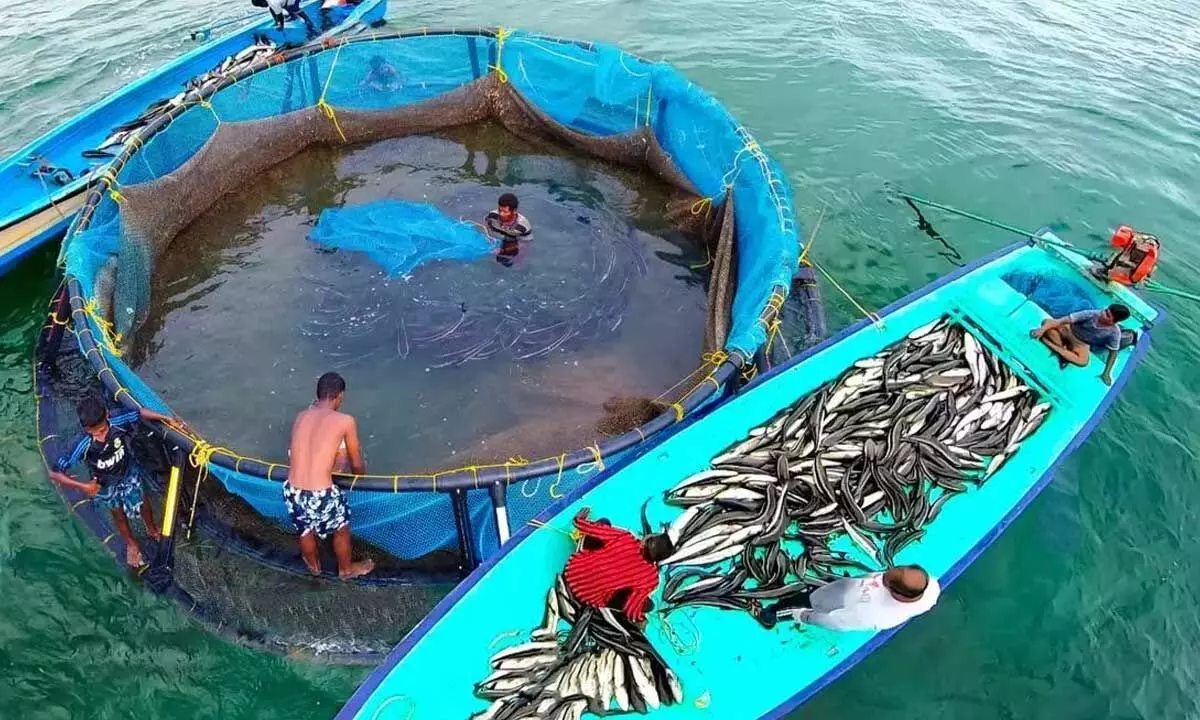Interim budget proposes boost to mariculture

Is mud crab and mussels the next fisheries earner?
Mangaluru: In response to the challenges faced by Indian aquaculturists, particularly the prevalence of diseases like white spots affecting shrimp farming, there is a noticeable shift towards exploring alternative crustaceans and mollusc species. The focus has now turned to the Mud crab (Mangrove crab), signalling a potential economic boom. Two strategic locations on the Karnataka coast, Chitrapu in Dakshina Kannada and Thallur in Udupi districts have been earmarked for commercial Mud crab farming.
The interim budget for 2024 has a sizable list of initiatives that will perk up the mariculture activities all along the coastal and estuarine ecosystems in the country. The budget proposals have listed out the creation of mariculture infrastructure in the coast, starting with Karnataka.
Farmers, equipped with diverse geographical areas under lease, have undergone training in Goa. The success stories of Chitrapu and Thallur, initially launched as demo farms and later transformed into commercial hubs, have become pioneering examples in mariculture.
Mud crabs, known to reach a substantial body weight of 1-1.5 kgs, command a favourable international market, especially in Europe and the US. Recently, these crabs have gained popularity in upscale Indian eateries, capturing the attention of consumers. Hardy and disease-resistant, mud crabs boast unique features, such as the ability to be transported over long distances without water. They can withstand dry environments inside cargo containers for more than 36 hours, aligning with international standards for transporting reefer cargo from farm to plate.
Senior scientists specialising in aquaculture at the Marine Product Export Development Authority (MPEDA) in Karwar expressed satisfaction with farmers’ enthusiasm for mud crab rearing. MPEDA has provided insights and experiential inputs to these farmers. The focus is on four species of mud crab—Scylla serrata, S. tranquebarica, S. paramamosain, and S. olivacea—considered valuable globally, with a significant portion of their production sent live to markets.
Encouragingly, small self-help groups, particularly in Kumta, Honnavar, and Karwar, have embraced mud crab rearing and achieved lucrative returns, according to officials. Speaking to Hans India Ravish Tandel of Kumta has expressed happiness over the Finance Minister’s proposals to develop infrastructure in the field. “This will bring in more investment and production activities with improved techniques and practices and more money for the farmers.”.
Coastal Marine Fisheries Research Institute (CMFRI) sources highlight the increasing demand for mud crabs in both domestic and export markets, including the UK, US, Australia, and West Asian countries. The presence of hatcheries in Sirkali near Pondicherry and Sindhudurg in Maharashtra underscores the opportunities for establishing similar facilities in Karnataka.
The Indian government’s interim budget proposals have further fueled the momentum in mariculture innovation. The allocation of funds for the development and promotion of alternative aquaculture practices, including mud crab farming, signifies a strategic push towards economic diversification.
In this landscape of change, the United Nations Development Programme (UNDP) and the Food and Agriculture Organisation (FAO) are actively supporting Mud Crab projects worldwide, further reinforcing the potential for this emerging economic sector. As global markets open up to sustainable aquaculture practices, India stands at the forefront of embracing novel opportunities, potentially positioning Mud crabs as the next economic frontier in the country’s thriving mariculture industry.

